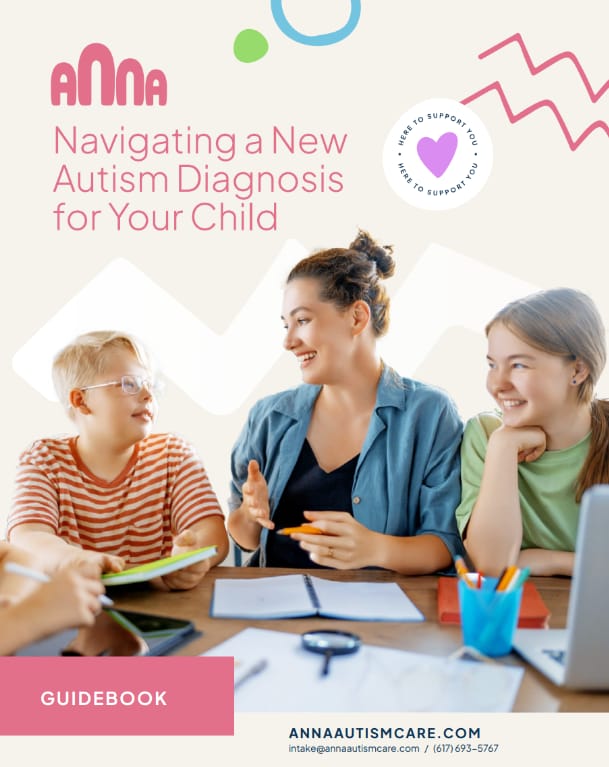- The Autism Advocate
- Posts
- The Autism Advocate
The Autism Advocate
June 2025

Welcome to The Autism Advocate, ANNA’s monthly newsletter! We hope this will be a helpful source of information about upcoming events, tips for caregivers, community resources and more. We would love to hear your feedback and ideas for future editions!
ANNA Announcements
Holiday Closures
Please note that all ANNA centers will be closed on the following dates:
Friday, July 4th in observance of Independence Day
Research Study Opportunity
UMass Chan Medical School is currently enrolling for a longitudinal research study for children who are 6-8 months old and are younger siblings of children with autism. Children participating in the study will receive language support sessions and developmental monitoring, while continuing to be eligible for services outside of the study. Participation can be done remotely or include home visits, and families will receive multiple gift cards throughout the study. Interested families can request more information by calling (774) 479-6025 or emailing [email protected].
Ask ANNA
Do you have something you’d like to ask the ANNA team? Please submit your question here and we will answer it in a future newsletter!
Let’s Talk About Neurodiversity
Here at ANNA, we are committed to delivering services and supports that are neurodiversity-affirming, and we recognize that this is a continuous process with lots of opportunities for learning! This month, we’re exploring a common misconception: that being neurodiversity-affirming means not accessing services or supports.
What Being Neurodiversity-Affirming is Not
Neurodiversity is a way of understanding that brains work differently, and that those differences are natural and valuable. But being neurodiversity-affirming doesn’t mean that you need to avoid support or act like challenges don’t exist. In many cases, accessing services and seeking help are important parts of supporting neurodivergent children in meaningful and affirming ways.
Being affirming means that we approach these supports and services not with the goal of “fixing” a child, but with the goal of helping them feel safe, understood, and empowered. This could look like using a communication device so a child can express themselves in the way that works for them, or it might involve offering movement breaks instead of expecting a child to stay still for long periods of time. Another important way to provide support in a neurodiversity-affirming way is to work on emotional regulation through connection and co-regulation, rather than strictly through rewards and consequences or punishments.
Remember that seeking services for your child does not mean you are not being neurodiversity-affirming. Respectful and affirming services can be an important part of supporting a child’s unique identity and helping them to build skills that enable them to be the best version of themselves!
Support Your Child’s Development
With the arrival of warmer weather, now is a good time to think about water safety – a topic that is particularly important for families of autistic children. Many autistic children are drawn to water, but may not recognize danger or respond to their name in an emergency. This combination can increase the risk of accidents, so extra precautions are essential.
Be sure to always closely supervise your child whenever they are near water, no matter how shallow or familiar the area may seem. Even a few inches of water can be dangerous. Taking steps such as fencing pools, installing door alarms, or using safety covers can help prevent unsupervised access. Early swim lessons tailored to your child’s needs can also build confidence and essential water skills, but this should never replace close supervision.
If your child has a tendency to wander, it’s a good idea to share water safety information with neighbors and caregivers and to include water hazards in your family’s emergency plan. These strategies work together to create an environment where your child can enjoy water, while you have peace of mind that they can do so safely.
For more information, here is a helpful resource from the Massachusetts Department of Developmental Services - Autism, Wandering, and Water Safety: Information for Caregivers
Staff Spotlight

Meet Daniela Silva, BCBA!
Daniela has been dedicated to the field of Applied Behavior Analysis (ABA) since 2014. She earned her master’s degree in ABA from Western New England University and has been a Board Certified Behavior Analyst (BCBA) since 2020. Daniela has extensive experience working with autistic individuals ranging from 1 to 30 years old across a variety of settings, including in-home, school, clinic, residential, daycare, and community environments. Daniela is passionate about using evidence-based strategies to foster meaningful progress in their clients.
Daniela is thrilled to have joined ANNA, where she contributes to neurodiversity-affirming ABA services that are naturalistic and fun for clients! Outside of work, Daniela enjoys dancing and spending time with their two dogs and cat.
Featured Resource

Navigating a New Autism Diagnosis for Your Child
This month, we are excited to share our new guidebook: Navigating a New Autism Diagnosis for Your Child! This guidebook includes key terms, frequently asked questions, tips on finding quality services providers, ideas for building community and connections, safety considerations, and more. We hope this will be a helpful resource, particularly for families early in their journey.
Please check it out on our website, where you can also request that a copy be emailed to you - ANNA New Diagnosis Guidebook. If you would like a printed copy, or if you have any questions or feedback about the guidebook, please contact Ashley at [email protected].
Recommended Reading

Spencer’s Special Interests, written by Paige Amanda
Spencer’s Special Interests features Spencer Kimbell, a girl who isn’t interested in dance, soccer, or anything that involves pants, but loves baking! It’s her favorite thing and, to many adults, it seems like that’s all she wants to do.
While others ask, “When will Spencer try something new?”, her parents trust that she’ll branch out when she’s ready. In the meantime, they sign her up for a new cooking class, where Spencer feels completely at home. She enjoys it so much that leaving can be a challenge. But is it the cooking that’s keeping her there, or something else?
This engaging book is written from lived experience and blends fun storytelling with realistic insights and practical support, providing important representation for autistic children and their families.
Caregiver Affirmation
“Being present is more important than being perfect.”
It’s always a good time for a reminder that you don’t have to have all the answers, say the right thing, or handle every moment perfectly. What matters most is that you consistently show up with love, effort, and the willingness to keep learning alongside your child.
Children don’t need perfect parents or caregivers. They need people who understand them, respond to their needs, advocate for them, and who are always willing to try again after a hard moment. Simply being fully present for your child helps them feel safe, connected, and valued, and that is infinitely more important than being perfect.
We’d love to hear about your experiences with ANNA! Leaving a Google review is a great way to help other families learn about our services. If you have a moment, you can share your thoughts by clicking this button. Thank you for being part of our community!